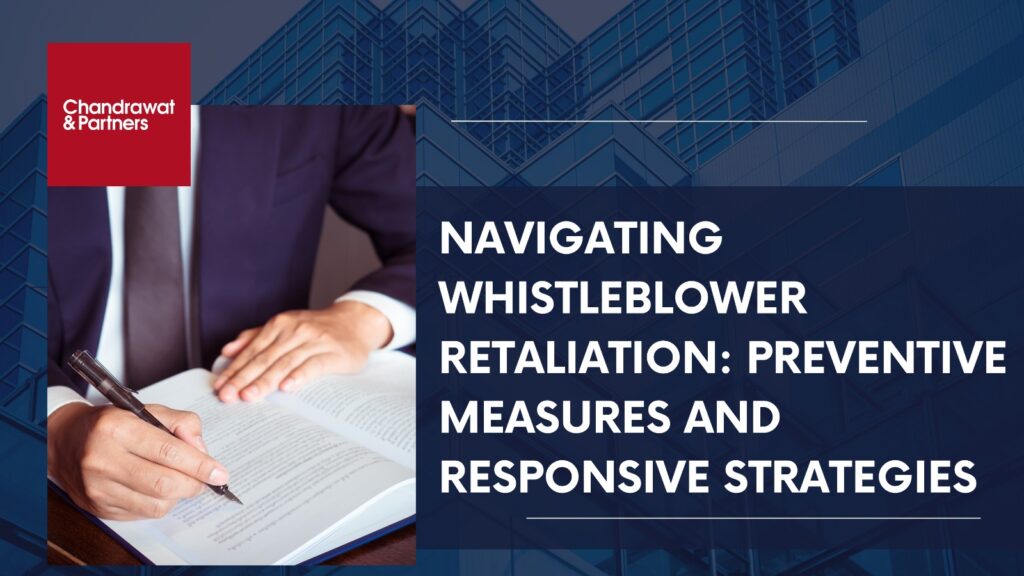INTRODUCTION
Whistleblowing is essential for ensuring accountability and transparency in various sectors, including government, business, and non-profit organizations. Individuals who report illegal or unethical conduct within an organization, known as whistleblowers, are at risk of retaliation from their employers or colleagues. Retaliation can take various forms, including harassment, demotion, termination, and even personal threats. In this blog, we will discuss the significance of preventive measures and response strategies in addressing whistleblower retaliation.
Whistleblowing plays a pivotal role in upholding organizational integrity and safeguarding the public interest. Whistleblowers help protect customers, investors, and the broader public by exposing illegal practices, corruption, fraud, or other forms of misconduct. Their actions have far-reaching consequences, unveiling hidden threats and holding those responsible accountable. However, whistleblowing carries inherent risks, as many individuals who speak out face repercussions from the very organizations they aim to reform. Therefore, understanding the preventive measures and response methods required to protect whistleblowers and foster a culture that supports ethical behavior and accountability is crucial.
IMPORTANCE OF WHISTLEBLOWING
Before delving into preventive measures and response strategies, it is essential to grasp the significance of whistleblowing. Whistleblowers serve as catalysts for positive change by exposing wrongdoing and safeguarding the interests of the public, employees, and stakeholders. Their actions lead to accountability, improved organizational practices, and the prevention of potential harm.
Furthermore, whistleblowing contributes to the integrity and credibility of organizations. When misconduct goes unchecked, it erodes trust and damages the reputation of the specific organization involved and the industry as a whole. Organizations demonstrate their commitment to ethical practices and transparent operations by supporting and safeguarding whistleblowers. This commitment not only helps prevent future wrongdoing but also enhances the public’s perception of the organization, fostering trust and a positive reputation in the marketplace. Whistleblowing catalyzes positive change, resulting in better governance, increased accountability, and a healthier, more responsible corporate environment.
PREVENTIVE MEASURES
- Establish a Strong Ethical Culture: Organizations must cultivate an environment that promotes ethical behaviour while discouraging illegal or unethical conduct. This can be achieved through comprehensive ethics training programs, clear codes of conduct, and visible support from top leadership.
- Confidential Reporting Mechanism: Implement anonymous reporting methods, such as hotlines or online platforms, to provide whistleblowers with a secure way to submit concerns without fear of identification. All employees should be aware of the availability and confidentiality of these reporting tools.
- Non-Retaliation Policy: Develop a non-retaliation policy that explicitly states that whistleblowers will be protected from retaliation in any form. This policy should be regularly communicated to employees and consistently enforced.
- Education and Awareness: Conduct regular training sessions to educate employees about the importance of whistleblowing, the risks of retaliation, and the protections available to whistleblowers. These workshops can also include guidance on recognizing and reporting unethical behavior.
- Anonymous Communication: Ensure that whistleblowers have the option to communicate anonymously, either through dedicated email accounts or legal representatives. This additional layer of protection can reassure those concerned about retaliation.
RESPONSE STRATEGIES
- Prompt and Thorough Investigation: Upon receiving a whistleblower report, organizations must conduct a swift and thorough investigation. This demonstrates a commitment to addressing the issue and can help deter further retaliation. Establish a transparent investigation process and keep the whistleblower informed of the investigation’s progress.
- Protection and Support: Whistleblowers should receive protection and support throughout the investigation and beyond. This may involve providing legal assistance, relocation support, and counseling services to help them cope with the emotional toll of retaliation.
- Legal Remedies: Organizations should be aware of the legal protections available to whistleblowers and ensure compliance with applicable laws. Whistleblower protection laws vary by jurisdiction, so it is crucial to seek legal counsel in the relevant region.
- Communication and Transparency: Maintain open and transparent communication with the whistleblower. Provide regular updates on the investigation’s status and any actions taken as a result of their report. This builds trust and reassures the whistleblower that their concerns are being addressed.
- Learning from Incidents: Whistleblower reports should be viewed as opportunities for organizational learning and improvement. Examine the root causes of reported issues and take corrective actions to prevent similar situations in the future. This proactive approach can help foster a culture of transparency and accountability within the organization.
In summary, whistleblowers play a crucial role in exposing wrongdoing and promoting accountability within organizations. However, the threat of retaliation can deter individuals from coming forward with their concerns. Organizations can create an environment that attracts and protects whistleblowers by implementing preventive measures such as fostering a strong ethical culture, providing confidential reporting systems, and enforcing non-retaliation policies. In cases of retaliation, timely and thorough investigations, support for the whistleblower, adherence to legal safeguards, transparent communication, and organizational learning can help mitigate the impact and prevent future incidents. Ultimately, organizations can enhance their integrity and cultivate a culture of transparency and ethical behaviour by supporting and safeguarding whistleblowers.
For more information or queries, please email us at
enquiries@chandrawatpartners.com




